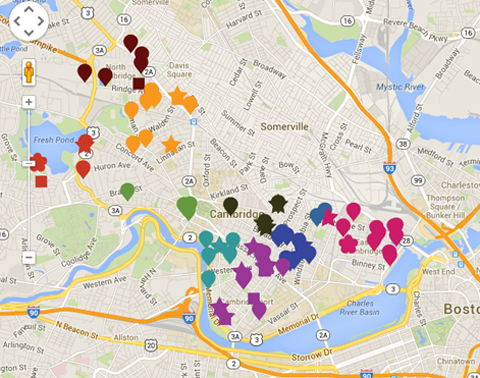 When I checked out Yuvee, Inc.’s newly launched “map of the Web” for visual arts in the greater Boston area, I was pleased to find links to the various museums and galleries laid out on a single page that showed museums’ geographic relationship to one another–and leading to brief summaries of each museum’s collection, its Twitter, Pinterest, and other social sites, as well as its address and phone number.
When I checked out Yuvee, Inc.’s newly launched “map of the Web” for visual arts in the greater Boston area, I was pleased to find links to the various museums and galleries laid out on a single page that showed museums’ geographic relationship to one another–and leading to brief summaries of each museum’s collection, its Twitter, Pinterest, and other social sites, as well as its address and phone number.
But I was more than pleased–actually, I was amazed to find a section devoted to public art –including small galleries and installations– some of which are in quite out-of the way places. For example, one link, to the City of Cambridge’s public art tour, took me to a mesmorizing video installation I’d first discovered after attending a Yoga class at the youth center on Huron Avenue.
 The video, by The Cantabridgians”, by Michael Oatman, includes 23 1-minute portraits of Cambridge Residents posed with objects in locations of their choice, designed to provide a sense of them in their particular neighborhoods.
The video, by The Cantabridgians”, by Michael Oatman, includes 23 1-minute portraits of Cambridge Residents posed with objects in locations of their choice, designed to provide a sense of them in their particular neighborhoods.
Other links from Web Hub’s map of the “public” visual arts go to the City of Boston Public Art sites and the Rose Kennedy Greenway.
 The Boston Art Map, accessible at maps.webhub.mobi/boston-art, is one of the first sites brought to “life” by newly launched “Yuvee, Inc.,” under the auspices of “WebHub” and “A Social Atlas of the Web.” According to Yuvee founder Tim Higginson, WebHub is focused on enabling the next generation of Web experience for the “cross device”‘ lifestyle in which individuals use smartphones to access the web.
The Boston Art Map, accessible at maps.webhub.mobi/boston-art, is one of the first sites brought to “life” by newly launched “Yuvee, Inc.,” under the auspices of “WebHub” and “A Social Atlas of the Web.” According to Yuvee founder Tim Higginson, WebHub is focused on enabling the next generation of Web experience for the “cross device”‘ lifestyle in which individuals use smartphones to access the web.
“An atlas is a collection of geographic maps, which help people find their way from A to B, learn and explore what is in an area and see connections between places, Higginson explains. “Maps” of the Web do the same thing for people who are using the Internet. They give people an Instant, organized way to find and explore a whole of resources and the ability to switch easily among maps on different topics. At http://WebHub. mobi, “anyone can make a map of the Web on any topic, and share the map with others.
According to Higginson, the map concept is ” a vast improvement” over traditional search engines, which deliver long, linear lists with items separated from the others, and require individual searches and sifting through pages of results. Such lists do not convey interrelationships and structure among items. Other resources, such as Pinterest, Tumblr, Facebook and Youtube tend to focus on single types of information. In contrast, he explains , “maps” of the Web can pull all these relevant items together in a structure, organized and annotated way, in a single URL that is always available from anyone’s smartphone, tablet, laptop, pc or other Web-enabled device.
The maps are independent of browser and OS, do not require downloads, syncing, re-doing searches, typing urls, or even knowing a know a URL on a topic covered by a map to get an in-depth experience of the Web on that topic. What is more, Higginson says, “WebHub is free and respects its users’ privacy. “We hope this Boston Art ‘map of the Web’ gives people a richer, faster, easier way to learn about and enjoy all the incredible things that are going on in the visual arts in and around Boston..and that people enjoy all the other maps available at www..webhub.mobi.”
I note that it’s possible to advertise on WebHub, which, Higginson says, is its business model.
–Anita M. Harris New Cambridge Observer is a publication of the Harris Communications Group, an award-winning public relations and marketing firm based in Cambridge, MA.




